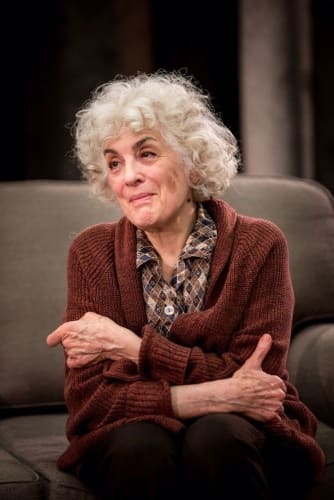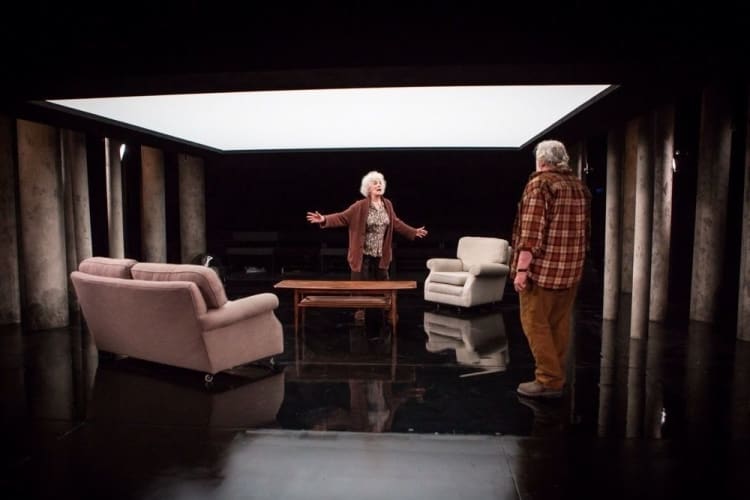Tom Holloway’s play Forget Me Not opens with a meeting in Liverpool between the character Gerry, an Australian in his sixties and his British birth mother (Eleanor Bron). It is their first meeting since Gerry (Russell Floyd) had been taken away from his community as a child by a priest without his mother’s consent and transported to Australia.
The meeting is awkward. Both are unsure what to say and Gerry, a troubled alcoholic with a lot of pent-up anger, finds it hard to say anything. He is even bothered by the simple task of deciding which chair to sit in.
The play then shifts to earlier scenes when in Australia he is learning that his mother is still alive. These scenes also give us a glimpse of his difficult relationship with his own daughter (Sarah Ridgeway).
Gerry’s life has been shaped by the traumatic events of being forcibly separated from his mother and then later abused in Australia by those who should have cared for him.
Russell Floyd plays the troubled Gerry with a fine attention to the detail of words, silence and gesture. He gives the impression of a character uneasy in his own body. His silence is fraught with an energy that seems on the constant verge of an explosion.
Between 1618 and 1970, Britain transported thousands of children to its colonies and former colonies. They were often taken without their parents consent, their names changed and their past lives hidden from them. Some were given secure homes but many suffered abuse, rape and terrible levels of exploitation.
These events have been largely hidden from history, their victims left to work their own way through the trauma, finding silence where they needed answers and justice.
Tom Holloway’s play gives us some idea of the trauma and its devastating effects. For those who have been through such an experience, it would have been a hard show to watch. Behind me in the theatre, a woman quietly cried through most of the performance.
There are weaknesses in this play. It shows us very little about Gerry and his mother that we couldn’t have known or guessed from the flyer that advertised the play. She is a loving woman who lost a child. He is a traumatised adult trying to make contact.
The other two characters seem inserted simply to give Gerry an opportunity to reveal a little bit more about himself.
The cruelty that mother and son experienced is only briefly described. We have no way of seeing why it happened or the complexity of its impact.
There is also a peculiar twist in the plot which might have been meant to emphasise how frustrating and difficult are the attempts to reunite these kidnapped children with their birth parents. Unfortunately, it feels like the author is trying to wring an extra level of sentiment out of the story. It was unnecessary and likely to irritate the audience.
In 2010, the British Prime Minister Gordon Brown apologised for Britain’s "unacceptable role in the shameful deportation of thousands of children." He added that "we are sorry that the voices of these children were not always heard."
Nobody was prosecuted for these crimes. There was no Truth Commission where powerful people who were involved in child trafficking could come forward and explain themselves. There was not even an enquiry public or otherwise into the institutions that so casually carried out these crimes.
Instead there was simply an apology and then a silence in which the voices of those children and their parents continued not to be heard.


